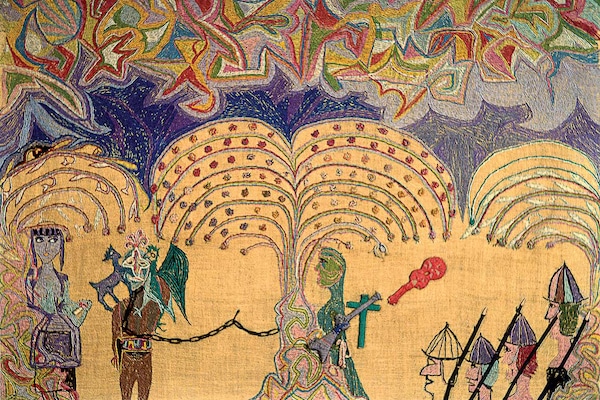The works of art in this dossier belong to Casa de las Américas’ Haydee Santamaría Art of Our America (Nuestra América) collection. Since its founding, Casa de las Américas has established close ties with a significant number of internationally renowned contemporary artists who have set visual arts trends in the region. Casa’s galleries have hosted temporary exhibitions including different artistic genres, expressions, and techniques by several generations of mainly Latin American and Caribbean artists. Many of these works, initially exhibited in Casa’s galleries, awarded prizes in its contests, and donated by the artists, have become part of the Haydee Santamaría Art of Our America collection, representing an exceptional artistic heritage.
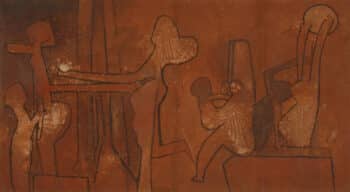
Roberto Matta (Chile), Cuba es la capital (‘Cuba Is the Capital’), 1963. Soil and plaster on Masonite (mural), 188 x 340 cm. Located at the entrance to Casa de las Américas.
Foreword
Cultural Policy and Decolonisation in the Cuban Socialist Project
Abel Prieto, director of Casa de las Américas
The Cuban Revolution came about in a country subordinated to the U.S. from all points of view. Although we had the façade of a republic, we were a perfect colony, exemplary in economic, commercial, diplomatic, and political terms, and almost in cultural terms.
Our bourgeoisie was constantly looking towards the North: from there, they imported dreams, hopes, fetishes, models of life. They sent their children to study in the North, hoping that they would assimilate the admirable competitive spirit of the Yankee ‘winners’, their style, their unique and superior way of settling in this world and subjugating the ‘losers’.
This ‘vice-bourgeoisie’, as Roberto Fernández Retamar baptised them, were not limited to avidly consuming whatever product of the U.S. cultural industry fell into their hands. Not only that—at the same time, they collaborated in disseminating the ‘American way of life’ in the Ibero-American sphere and kept part of the profits for themselves. Cuba was an effective cultural laboratory at the service of the Empire, conceived to multiply the exaltation of the Chosen Nation and its world domination. Cuban actresses and actors dubbed the most popular American television series into Spanish, which would later flood the continent. In fact, we were among the first countries in the region to have television in 1950. It seemed like a leap forward, towards so-called ‘progress’, but it turned out to be poisoned. Very commercial Cuban television programming functioned as a replica of the ‘made in the USA’ pseudo-culture, with soap operas, Major League and National League baseball games, competition and participation programmes copied from American reality shows, and constant advertising. In 1940, the magazine Selections of the Reader’s Digest, published by a company of the same name, began to appear in Spanish in Havana with all of its poison. This symbol of the idealisation of the Yankee model and the demonisation of the USSR and of any idea close to emancipation was translated and printed on the island and distributed from here to all of Latin America and Spain.
The very image of Cuba that was spread internationally was reduced to a tropical ‘paradise’ manufactured by the Yankee mafia and its Cuban accomplices. Drugs, gambling, and prostitution were all put at the service of VIP tourism from the North. Remember that the Las Vegas project had been designed for our country and failed because of the revolution.
Fanon spoke of the sad role of the ‘national bourgeoisie’—already formally independent from colonialism—before the elites of the old metropolis, ‘who happen to be tourists enamoured of exoticism, hunting, and casinos’. He added:
We only have to look at what has happened in Latin America if we want proof of the way the ex-colonised bourgeoisie can be transformed into ‘party’ organiser. The casinos in Havana and Mexico City, the beaches of Rio, Copacabana, and Acapulco, the young Brazilian and Mexican girls, the thirteen-year-old mestizas, are the scars of this depravation of the national bourgeoisie.1
Our bourgeoisie, submissive ‘party organisers’ of the Yankees, did everything possible for Cuba to be culturally absorbed by their masters during the neocolonial republic. However, there were three factors that slowed down this process: the work of intellectual minorities that defended, against all odds, the memory and values of the nation; the sowing of Martí’s principles and patriotism among teachers in Cuban public schools; and the resistance of our powerful, mestizo, haughty, and ungovernable popular culture, nurtured by the rich spiritual heritage of African origin.
In his speech ‘History Will Absolve Me’, Fidel listed the six main problems facing Cuba. Among them, he highlighted ‘the problem of education’ and referred to ‘comprehensive education reform’ as one of the most urgent missions that the future liberated republic would have to undertake.2 Hence, the educational and cultural revolution began practically from the triumph of 1 January 1959. On the 29th of that same month, summoned by Fidel, a first detachment of three hundred teachers alongside one hundred doctors and other professionals left for the Sierra Maestra to bring education and health to the most remote areas. Around those same days, Camilo and Che launched a campaign to eradicate illiteracy among the Rebel Army troops since more than 80% of the combatants were illiterate.
On 14 September, the former Columbia Military Camp was handed over to the Ministry of Education so that it could build a large school complex there. The promise of turning barracks into schools was beginning to be fulfilled, and sixty-nine military fortresses became educational centres. On 18 September, Law No. 561 was enacted, creating ten thousand classrooms and accrediting four thousand new teachers. The same year, cultural institutions of great importance were created: the Cuban Institute of Cinematographic Art and Industry (ICAIC), the National Publishing House, the Casa de las Américas, and the National Theatre of Cuba, which has a department of folklore and an unprejudiced and anti-racist vision unprecedented in the country. All of these new revolutionary institutions were oriented towards a decolonised understanding of Cuban and universal culture.
But 1961 was the key year in which a profound educational and cultural revolution began in Cuba. This was the year when Eisenhower ruptured diplomatic relations with our country. This was the year when our foreign minister, Raúl Roa, condemned ‘the policy of harassment, retaliation, aggression, subversion, isolation, and imminent attack by the U.S. against the Cuban government and people’ at the UN.3 This was the year of the Bay of Pigs invasion and the relentless fight against the armed gangs financed by the CIA. This was the year when the U.S. government, with Kennedy already at the helm, intensified its offensive to suffocate Cuba economically and isolate it from Nuestra América — Our America—and from the entire Western world.4 1961 was also the year when Fidel proclaimed the socialist character of the revolution on 16 April, the eve of the Bay of Pigs invasion, as Roa exposed the plan that was set to play out the following day. This is something that—considering the influence of the Cold War climate and the McCarthyite, anti-Soviet, and anti-communist crusade on the island—showed that the young revolutionary process had been shaping, at incredible speed, cultural hegemony around anti-imperialism, sovereignty, social justice, and the struggle to build a radically different country. But it was also the year of the epic of the literacy campaign; of the creation of the National School of Art Instructors; of Fidel’s meetings with intellectuals and his founding speech on our cultural policy, ‘Words to the Intellectuals’; of the birth of the National Union of Writers and Artists of Cuba (UNEAC) and the National Institute of Ethnology and Folklore.5
In 1999 in Venezuela—almost four decades later—Fidel summed up his thinking regarding the cultural and educational component in any true revolutionary process: ‘A revolution can only be the child of culture and ideas’.6 Even if it makes radical changes, even if it hands over land to the peasants and eliminates large estates, even if it builds houses for those who survive in unhealthy neighbourhoods, even if it puts public health at the service of all, even if it nationalises the country’s resources and defends its sovereignty, a revolution will never be complete or lasting if it does not give a decisive role to education and culture. It is necessary to change human beings’ conditions of material life, and it is necessary to simultaneously change the human being, their conscience, paradigms, and values.
For Fidel, culture was never something ornamental or a propaganda tool—a mistake commonly made throughout history by leaders of the left. Rather, he saw culture as a transformative energy of exceptional scope, which is intimately linked to conduct, to ethics, and is capable of decisively contributing to the ‘human improvement’ in which Martí had so much faith. But Fidel saw culture, above all, as the only imaginable way to achieve the full emancipation of the people: it is what offers them the possibility of defending their freedom, their memory, their origins, and of undoing the vast web of manipulations that limit the steps they take every day. The educated and free citizen who is at the centre of Martí’s and Fidel’s utopia must be prepared to fully understand the national and international environment and to decipher and circumvent the traps of the machinery of cultural domination.
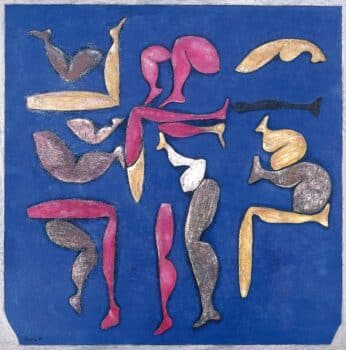
Enrique Tábara (Ecuador), Coloquio de frívolos (‘Colloquium of the Frivolous’), 1982. Acrylic on canvas, 140.5 x 140.5 cm.
In 1998, at the 6th Congress of the UNEAC, Fidel focused on the topic ‘related to globalisation and culture’. So-called ‘neoliberal globalisation’, he said, is ‘the greatest threat to culture—not only ours, but the world’s’. He explained how we must defend our traditions, our heritage, our creation, against ‘imperialism’s most powerful instrument of domination’. And, he concluded, ‘everything is at stake here: national identity, homeland, social justice, revolution, everything is at stake. These are the battles we have to fight now’.7 This is, of course, about ‘battles’ against cultural colonisation, against what Frei Betto calls ‘globo-colonisation’, against a wave that can liquidate our identity and the revolution itself.
Fidel was already convinced that, in education, in culture, in ideology, there are advances and setbacks. No conquest can be considered definitive. That is why he returns to the subject of culture in his shocking speech on 17 November 2005 at the University of Havana.8 The media machinery, together with incessant commercial propaganda, Fidel warns us, come to generate ‘conditioned responses’. ‘The lie’, he says, ‘affects one’s knowledge’, but ‘the conditioned response affects the ability to think’.9 In this way, Fidel continued, if the Empire says ‘Cuba is bad’, then ‘all the exploited people around the world, all the illiterate people, and all those who don’t receive medical care or education or have any guarantee of a job or of anything’ repeat that ‘the Cuban Revolution is bad’.10 Hence, the diabolical sum of ignorance and manipulation engenders a pathetic creature: the poor right-winger, that unhappy person who gives his opinion and votes and supports his exploiters.
‘Without culture’, Fidel repeated, ‘no freedom is possible’.11 We revolutionaries, according to him, are obliged to study, to inform ourselves, to nurture our critical thinking day by day. This cultural education, together with essential ethical values, will allow us to liberate ourselves definitively in a world where the enslavement of minds and consciences predominates. His call to ‘emancipat[e] ourselves by ourselves and with our own efforts’ is equivalent to saying that we must decolonise ourselves with our own efforts.12 And culture is, of course, the main instrument of that decolonising process of self-learning and self-emancipation.
In Cuba, we are currently more contaminated by the symbols and fetishes of ‘globo-colonisation’ than we have been at other times in our revolutionary history. We must combat the tendency to underestimate these processes, and we must work in two fundamental directions: intentionally promoting genuine cultural options and fostering a critical view of the products of the hegemonic entertainment industry. It is essential to strengthen the effective coordination of institutions and organisations, communicators, teachers, instructors, intellectuals, artists, and other actors who contribute directly or indirectly to the cultural education of our people. All revolutionary forces of culture must work together more coherently. We must turn the meaning of anti-colonial into an instinct.
Introduction
In 1959, the Cuban revolutionary leader Haydee Santamaría (1923—1980) arrived at a cultural centre in the heart of Havana. This building, the revolutionaries decided, would be committed to promoting Latin American art and culture, eventually becoming a beacon for the progressive transformation of the hemisphere’s cultural world. Renamed Casa de las Américas (‘Home of the Americas’), it would become the heartbeat of cultural developments from Chile to Mexico. Art saturates the walls of the house, and in an adjacent building sits the massive archive of correspondence and drafts from the most significant writers of the past century. The art from Casa adorns this dossier. The current director of Casa, Abel Prieto—whose words open this dossier — is a novelist, a cultural critic, and a former minister of culture. His mandate is to stimulate discussion and debate in the country.
Over the course of the past decade, Cuba’s intellectuals have been gripped by the debate over decolonisation and culture. Since 1959, the Cuban revolutionary process has—at great cost—established the island’s political sovereignty and has struggled against centuries of poverty to cement its economic sovereignty. From 1959 onwards, under the leadership of the revolutionary forces, Cuba has sought to generate a cultural process that allows the island’s eleven million people to break with the cultural suffocation which is the legacy of both Spanish and U.S. imperialism. Is Cuba, six decades since 1959, able to say that it is sovereign in cultural terms? The balance sheet suggests that the answer is complex since the onslaught of U.S. cultural and intellectual production continues to hit the island like its annual hurricanes.
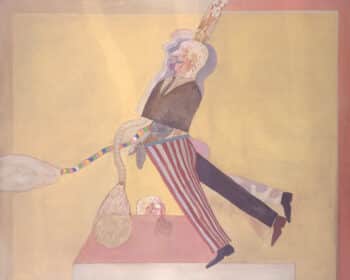
Antonio Seguí (Argentina), Untitled, 1965. Oil on canvas, 200 x 249 cm.
To that end, Casa de las Américas has been holding a series of encounters on the issue of decolonisation. In July 2022, Vijay Prashad, the director of Tricontinental: Institute for Social Research, delivered a lecture there that built upon the work being produced by the institute. Dossier no. 56, Ten Theses on Marxism and Decolonisation, draws from and expands upon the themes of that talk.
Ten Theses on Marxism and Decolonisation
Thesis One: The End of History. The collapse of the USSR and the communist state system in Eastern Europe in 1991 came alongside a terrible debt crisis in the Global South that began with Mexico’s default in 1982. These two events—the demise of the USSR and the weakness of the Third World Project—were met with the onslaught of U.S. imperialism and a U.S.-driven globalisation project in the 1990s. For the left, this was a decade of weakness as our left-wing traditions and organisations experienced self-doubt and could not easily advance our clarities around the world. History had ended, said the ideologues of U.S. imperialism, with the only possibility forward being the advance of the U.S. project. The penalty inflicted upon the left by the surrender of Soviet leadership was heavy and led not only to the shutting down of many left parties, but also to the weakened confidence of millions of people with the clarities of Marxist thought.
Thesis Two: The Battle of Ideas. During the 1990s, Cuban President Fidel Castro called upon his fellow Cubans to engage in a ‘battle of ideas’, a phrase borrowed from The German Ideology (1846) by Karl Marx and Friedrich Engels.1 What Castro meant by this phrase is that people of the left must not cower before the rising tide of neoliberal ideology but must confidently engage with the fact that neoliberalism is incapable of solving the basic dilemmas of humanity. For instance, neoliberalism has no answer to the obstinate fact of hunger: 7.9 billion people live on a planet with food enough for 15 billion, and yet roughly 3 billion people struggle to eat. This fact can only be addressed by socialism and not by the charity industry.2 The Battle of Ideas refers to the struggle to prevent the conundrums of our time—and the solutions put forth to address them—from being defined by the bourgeoisie. Instead, the political forces for socialism must seek to offer an assessment and solutions far more realistic and credible. For instance, Castro spoke at the United Nations in 1979 with great feeling about the ideas of ‘human rights’ and ‘humanity’:
There is often talk of human rights, but it is also necessary to speak of the rights of humanity. Why should some people walk around barefoot so that others can travel in luxurious automobiles? Why should some live for 35 years so that others can live for 70? Why should some be miserably poor so that others can be overly rich? I speak in the name of the children in the world who do not have a piece of bread. I speak in the name of the sick who do not have medicine. I speak on behalf of those whose right to life and human dignity has been denied.3
When Castro returned to the Battle of Ideas in the 1990s, the left was confronted by two related tendencies that continue to create ideological problems in our time:
- Post-Marxism. An idea flourished that Marxism was too focused on ‘grand narratives’ (such as the importance of transcending capitalism for socialism) and that fragmentary stories would be more precise for understanding the world. The struggles of the working class and peasantry to gain power in society and over state institutions were seen as just another false ‘grand narrative’, whereas the fragmented politics of the non-governmental organisations were seen as more feasible. The retreat from power into service delivery and into a politics of reform was made in the name of going beyond Marx. But this argument—to go beyond Marx—was really, as the late Aijaz Ahmad pointed out, an argument to return to the period before Marx, to neglect the facts of historical materialism and the zig-zag possibility of building socialism as the historical negation of capitalist brutality and decadence. Post-Marxism was a return to idealism and to perfectionism.
- Post-colonialism. Sections of the left began to argue that the impact of colonialism was so great that no amount of transformation would be possible, and that the only answer to what could come after colonialism was a return to the past. They treated the past, as the Marxist José Carlos Mariátegui argued in 1928 about the idea of indigenism, as a destination and not as a resource. Several strands of post-colonial theory developed, some of them offering genuine insights often drawn from the best texts of patriotic intellectuals of the new post-colonial nations and of the national liberation revolutionary tradition (anchored by writers such as Frantz Fanon). By the 1990s, the post-colonial tradition, which had previously been committed to revolutionary change in the Third World, was now swept up in North Atlantic university currents that favoured revolutionary impossibility. Afro-pessimism, one part of this new tradition, suggested—in its most extreme version—a desolate landscape of ‘social death’ for people of African descent, with no possibility of change. Decolonial thought or decolonialidad trapped itself by European thought, accepting the claim that many human concepts—such as democracy—are defined by the colonial ‘matrix of power’ or ‘matrix of modernity’. The texts of decolonial thought returned again and again to European thought, unable to produce a tradition that was rooted in the anti-colonial struggles of our time. The necessity of change was suspended in these variants of post-colonialism.

Antonio Martorell (Puerto Rico), Silla (‘Chair’), n.d., edition unknown. Woodcut. 100 x 62 cm.
The only real decolonisation is anti-imperialism and anti-capitalism. You cannot decolonise your mind unless you also decolonise the conditions of social production that reinforce the colonial mentality. Post-Marxism ignores the fact of social production as well as the need to build social wealth that must be socialised. Afro-pessimism suggests that such a task cannot be accomplished because of permanent racism. Decolonial thought goes beyond Afro-pessimism but cannot go beyond post-Marxism, failing to see the necessity of decolonising the conditions of social production.
Thesis Three: A Failure of Imagination. In the period from 1991 to the early 2000s, the broad tradition of national liberation Marxism felt flattened, unable to answer the doubts sown by post-Marxism and post-colonial theory. This tradition of Marxism no longer had the kind of institutional support provided in an earlier period, when revolutionary movements and Third World governments assisted each other and when even the United Nations’ institutions worked to advance some of these ideas. Platforms that developed to germinate left forms of internationalism—such as the World Social Forum—seemed to be unwilling to be clear about the intentions of peoples’ movements. The slogan of the World Social Forum, for instance, was ‘another world is possible’, which is a weak statement, since that other world could just as well be defined by fascism. There was little appetite to advance a slogan of precision, such as ‘socialism is necessary’.
One of the great maladies of post-Marxist thought—which derived much of its ammunition from forms of anarchism—has been the purist anxiety about state power. Instead of using the limitations of state power to argue for better management of the state, post-Marxist thought has argued against any attempt to secure power over the state. This is an argument made from privilege by those who do not have to suffer the obstinate facts of hunger and illiteracy, who claim that small-scale forms of mutual aid or charity are not ‘authoritarian’, like state projects to eradicate hunger. This is an argument of purity that ends up renouncing any possibility of abolishing the obstinate facts of hunger and other assaults on human dignity and well-being. In the poorer countries, where small-scale forms of charity and mutual aid have a negligible impact on the enormous challenges before society, nothing less than the seizure of state power and the use of that power to fundamentally eradicate the obstinate facts of inequality and wretchedness is warranted.
To approach the question of socialism requires close consideration of the political forces that must be amassed in order to contest the bourgeoisie for ideological hegemony and for control over the state. These forces experienced a pivotal setback when neoliberal globalisation reorganised production along a global assembly line beginning in the 1970s, fragmenting industrial production across the globe. This weakened trade unions in the most important, high-density sectors and invalidated nationalisation as a possible strategy to build proletarian power. Disorganised, without unions, and with long commute times and workdays, the entire international working class found itself in a situation of precariousness.4 The International Labour Organisation refers to this sector as the precariat—the precarious proletariat. Disorganised forces of the working class and the peasantry, of the unemployed and the barely employed, find it virtually impossible to build the kind of theory and confidence out of their struggles needed to directly confront the forces of capital.

Alirio Palacios (Venezuela), Muro público (‘Public Wall’), 1978. Oil on canvas, 180 x 200 cm.
One of the key lessons for working-class and peasant movements comes from the struggles being incubated in India. For the past decade, there have been general strikes that have included up to 300 million workers annually. In 2020—2021, millions of farmers went on a year-long strike that forced the government to retreat from its new laws to uberise agricultural work. How were the farmers’ movement and the trade union movement able to do this in a context in which there is very low union density and over 90% of the workers are in the informal sector?5 Because of the fights led by informal workers—primarily women workers in the care sector—trade unions began to take up the issues of informal workers—again, mainly women workers—as issues of the entire trade union movement over the course of the past two decades. Fights for permanency of tenure, proper wage contracts, dignity for women workers, and so on produced a strong unity between all the different fractions of workers. The main struggles that we have seen in India are led by these informal workers, whose militancy is now channelled through the organised power of the trade union structures. More than half of the global workforce is made up of women—women who do not see issues that pertain to them as women’s issues, but as issues that all workers must fight for and win. This is much the same for issues pertaining to workers’ dignity along the lines of race, caste, and other social distinctions. Furthermore, unions have been taking up issues that impact social life and community welfare outside of the workplace, arguing for the right to water, sewage connections, education for children, and to be free from intolerance of all kinds. These ‘community’ struggles are an integral part of workers’ and peasants’ lives; by entering them, unions are rooting themselves in the project of rescuing collective life, building the social fabric necessary for the advance towards socialism.
Thesis Four: Return to the Source. It is time to recover and return to the best of the national liberation Marxist tradition. This tradition has its origins in Marxism-Leninism, one that was always widened and deepened by the struggles of hundreds of millions of workers and peasants in the poorer nations. The theories of these struggles were elaborated by people such as José Carlos Mariátegui, Ho Chi Minh, EMS Namboodiripad, Claudia Jones, and Fidel Castro. There are two core aspects to this tradition:
- From the words ‘national liberation’, we get the key concept of sovereignty. The territory of a nation or a region must be sovereign against imperialist domination.
- From the tradition of Marxism, we get the key concept of dignity. The fight for dignity implies a fight against the degradation of the wage system and against the old, wretched, inherited social hierarchies (including along the lines of race, gender, sexual orientation, and so on).
Thesis Five: ‘Slightly Stretched’ Marxism. Marxism entered the anti-colonial struggles not through Marx directly, but more accurately through the important developments that Vladimir Lenin and the Communist International made to the Marxist tradition. When Fanon said that Marxism was ‘slightly stretched’ when it went out of its European context, it was this stretching that he had in mind.6 Five key elements define the character of this ‘slightly stretched’ Marxism across a broad range of political forces:
- It was clear to the early Marxists that liberalism would not solve the dilemmas of humanity, the obstinate facts of life under capitalism (such as hunger and ill-health). Not one capitalist state project put the solution to these dilemmas at the heart of its work, leaving it instead to the charity industry. The capitalist state projects pushed the idea of ‘human rights’ to abstraction; Marxists, on the other hand, recognised that only if these dilemmas are transcended can human rights be established in the world.
- The modern form of industrial production is the precondition for this transcendence because only it can generate sufficient social wealth that can be socialised. Colonialism did not permit the development of productive forces in the colonised world, thereby making it impossible to create sufficient social wealth in the colonies to transcend these dilemmas.
- The socialist project in the colonies had to fight against colonialism (and, therefore, for sovereignty) as well as capitalism and its social hierarchies (and, therefore, for dignity). These remain the two key aspects of national liberation Marxism.
- Due to the lack of development of industrial capitalism in the colonies, and therefore of a large enough number of industrial workers (the proletariat), the peasantry and agricultural workers had to be a key part of the historical bloc of socialism.
- It is important to register that socialist revolutions took place in the poorer parts of the world—Russia, Vietnam, China, Cuba—and not in the richer parts, where the productive forces had been better developed. The dual task of the revolutionary forces in poorer states that had won independence and instituted left governments was to build the productive forces and to socialise the means of production. The governments in these countries, shaped and supported by public action, had a historical mission far more complex than anything envisaged by the first generation of Marxists. A new, boundless Marxism emerged from these places, where an experimental attitude towards socialist construction emerged. However, many of these developments in socialist construction were not elaborated into theory, which meant that the theoretical tradition of national liberation Marxism was not fully available to contest both the post-Marxist and post-colonial assault on socialist praxis in the Third World.
Thesis Six: Dilemmas of Humanity. Reports come regularly about the terrible situation facing the world, from hunger and illiteracy to the ever more frequent outcomes of the climate catastrophe. Social wealth that could be spent to address these deep dilemmas of humanity is squandered on weapons and tax havens. The United Nations’ 17 Sustainable Development Goals (SDGs) to end hunger and promote peace would require an infusion of $4.2 trillion per year, but, as it stands, an infinitesimal fraction of this amount is spent to address these goals.7 With the pandemic and galloping inflation, even less money will go towards SDGs, and benchmarks measuring human well-being, sovereignty, and dignity will slip further and further away. Hunger, the greatest dilemma of humanity, is no longer within sight of being eradicated (except in China, where absolute poverty was ended in 2021).8 It is estimated that around 3 billion people now struggle with various forms of daily hunger.9
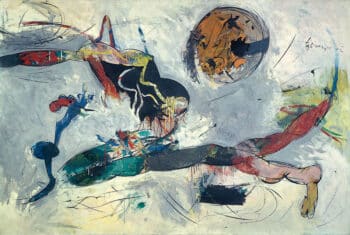
Hervé Télémaque (Haiti), Fait divers, 1962. Oil on canvas, 130 x 195 cm.
Take the case of Zambia and the fourth SDG to eradicate illiteracy, for example. Approximately 60% of the children in classes 1 to 4 in the Copperbelt cannot read.10 This is a region that produces much of the world’s copper, which is essential to our electronics. The parents of these children bring the copper to the world market, but their children cannot read. Neither post-Marxism nor post-colonialism addresses the fact of illiteracy or these parents’ determination for their children to be able to read. The theory of national liberation Marxism, rooted in sovereignty and dignity, however, does address these questions: it demands that Zambia control copper production and receive higher royalty payments (sovereignty), and it demands that the Zambian working class take a greater share of the surplus value (dignity). Greater sovereignty and dignity are pathways to address the dilemmas facing humanity. But rather than spend social wealth on these elementary advances, those who own property and exercise privilege and power spend over $2 trillion per year on weapons and many trillions on security forces (from the military to the police).11
Thesis Seven: The Rationality of Racism and Patriarchy. It is important to note that, under the conditions of capitalism, the structures of racism and patriarchy remain rational. Why is this the case? In Capital (1867), Marx detailed two forms for the extraction of surplus value and hinted at a third form. The first two forms (absolute surplus value and relative surplus value) were described and analysed in detail, pointing out how the theft of time over the course of the working day extracts absolute surplus value from the waged worker and how productivity gains both shorten the time needed for workers to produce their wages and increase the amount of surplus produced by them (relative surplus value). Marx also suggested a third form of extraction, writing that, in some situations, workers are paid less than would be justified by any civilised understanding of wages at that historical juncture. He noted that capitalists try to push ‘the wage of the worker down below the value of his labour power’, but he did not discuss this form further because of the importance for his analysis that labour power must be bought and sold at full value.12
This third consideration, which we call super-exploitation, is not immaterial for our analysis since it is central to the discussion of imperialism. How are the suppression of wages and the refusal to increase royalty payments for raw material extraction justified? By a colonial argument that, in certain parts of the world, people have lower expectations for life and therefore their social development can be neglected. This colonial argument applies equally to the theft of wages from women who perform care work, which is either unpaid or grossly underpaid on the grounds that it is ‘women’s work’.13 A socialist project is not trapped by the structures of racism and patriarchy since it does not require these structures to increase the capitalist’s share of surplus value. However, the existence of these structures over centuries, deepened by the capitalist system, has created habits that are difficult to overturn merely by legislation. For that reason, a political, cultural, and ideological struggle must be waged against the structures of racism and patriarchy and must be treated with as much importance as the class struggle.
Thesis Eight: Rescue Collective Life. Neoliberal globalisation vanquished the sense of collective life and deepened the despair of atomisation through two connected processes:
- by weakening the trade union movement and the socialistic possibilities that come within the public action and workplace struggle rooted in trade unionism.
- by substituting the idea of the citizen with the idea of the consumer—in other words, the idea that human beings are principally consumers of goods and services, and that human subjectivity can be best appreciated through a desire for things.
The breakdown of social collectivity and the rise of consumerism harden despair, which morphs into various kinds of retreat. Two examples of this are: a) a retreat into family networks that cannot sustain the pressures placed upon them by the withdrawal of social services, the increasing burden of care work on the family, and ever longer commute times and workdays; b) a move towards forms of social toxicity through avenues such as religion or xenophobia. Though these avenues provide opportunities to organise collective life, they are organised not for human advancement, but for the narrowing of social possibility.
How does one rescue collective life? Forms of public action rooted in social relief and cultural joy are an essential antidote to this bleakness. Imagine days of public action rooted in left traditions taking place each week and each month, drawing more and more people to carry out activities together that rescue collective life. One such activity is Red Books Day, which was inaugurated on 21 February 2020 by the International Union of Left Publishers, the same day that Marx and Engels published The Communist Manifesto in 1848. In 2020, the first Red Books Day, a few hundred thousand people around the world went into public places and read the manifesto in their different languages, from Korean to Spanish. In 2021, due to the pandemic, most of the events went online and we cannot really say how many people participated in Red Books Day, but, in 2022, nearly three-quarters of a million people joined in the various activities.
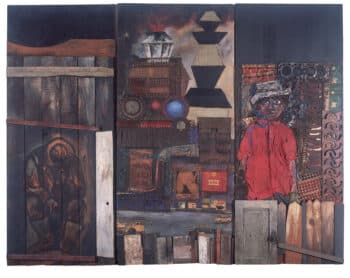
Antonio Berni (Argentina), Juanito Laguna, n.d. Painted wood and metal collage (triptych), 220 x 300 cm.
Part of rescuing collective life was vividly displayed during the pandemic when trade unions, youth organisations, women’s organisations, and student unions took to the public domain in Kerala (India) to build sinks, sew masks, establish community kitchens, deliver food, and conduct house-to-house surveys so that each person’s needs could be taken into account.14
Thesis Nine: The Battle of Emotions. Fidel Castro provoked a debate in the 1990s around the concept of the Battle of Ideas, the class struggle in thought against the banalities of neoliberal conceptions of human life. A key part of Fidel’s speeches from this period was not just what he said but how he said it, each word suffused with the great compassion of a man committed to the liberation of humanity from the tentacles of property, privilege, and power. In fact, the Battle of Ideas was not merely about the ideas themselves, but also about a ‘battle of emotions’, an attempt to shift the palate of emotions from a fixation on greed to considerations of empathy and hope.
One of the true challenges of our time is the bourgeoisie’s use of the culture industries and the institutions of education and faith to divert attention away from any substantial discussion about real problems—and about finding common solutions to social dilemmas—and towards an obsession with fantasy problems. In 1935, the Marxist philosopher Ernst Bloch called this the ‘swindle of fulfilment’, the seeding of a range of fantasies to mask their impossible realisation. The benefit of social production, Bloch wrote, ‘is reaped by the big capitalist upper stratum, which employs gothic dreams against proletarian realities’.15 The entertainment industry erodes proletarian culture with the acid of aspirations that cannot be fulfilled under the capitalist system. But these aspirations are enough to weaken any working-class project.
A degraded society under capitalism produces a social life that is suffused with atomisation and alienation, desolation and fear, anger and hate, resentment and failure. These are ugly emotions that are shaped and promoted by the culture industries (‘you can have it too!’), educational establishments (‘greed is the prime mover’), and neo-fascists (‘hate immigrants, sexual minorities, and anyone else who denies you your dreams’). The grip of these emotions on society is almost absolute, and the rise of neo-fascists is premised upon this fact. Meaning feels emptied, perhaps the result of a society of spectacles that has now run its course.

Tilsa Tsuchiya (Peru), Pintura N° 1 (‘Painting N° 1’), 1972. Oil on canvas, 90 x 122 cm.
From a Marxist perspective, culture is not seen as an isolated and timeless aspect of human reality, nor are emotions seen as a world of their own or as being outside of the developments of history. Since human experiences are defined by the conditions of material life, ideas of fate will linger on as long as poverty is a feature of human life. If poverty is transcended, then fatalism will have a less secure ideological foundation, but it does not automatically get displaced. Cultures are contradictory, bringing together a range of elements in uneven ways out of the social fabric of an unequal society that oscillates between reproducing class hierarchy and resisting elements of social hierarchy. Dominant ideologies suffuse culture through the tentacles of ideological apparatuses like a tidal wave, overwhelming the actual experiences of the working class and the peasantry. It is, after all, through class struggle and through the new social formations created by socialist projects that new cultures will be created—not merely by wishful thinking.
It is important to recall that, in the early years of each of the revolutionary processes—from Russia in 1917 to Cuba in 1959—cultural efflorescence was saturated with the emotions of joy and possibility, of intense creativity and experimentation. It is this sensibility that offers a window into something other than the ghoulish emotions of greed and hatred.
Thesis Ten: Dare to Imagine the Future. One of the enduring myths of the post-Soviet era is that there is no possibility of a post-capitalist future. This myth came to us from within the triumphalist U.S. intellectual class, whose ‘end of history’ sensibility helped to strengthen orthodoxy in such fields as economics and political theory, preventing open discussions about post-capitalism. Even when orthodox economics could not explain the prevalence of crises, including the total economic collapse in 2007—08, the field itself retained its legitimacy. These myths were made popular by Hollywood films and television shows, where disaster and dystopian films suggested planetary destruction rather than socialist transformation. It is easier to imagine the end of the earth than a socialist world.
During the economic collapse, the phrase ‘too big to fail’ settled on the public consciousness, reinforcing the eternal nature of capitalism and the dangers of even trying to shake its foundations. The system stood at a standstill. Austerity growled at the precarious. Small businesses crumpled for lack of credit. And yet, there was no mass consideration of going beyond capitalism. World revolution was not seen on the immediate horizon. This partial reality suffocated so much hope in the possibility of going beyond this system, a system—too big to fail—that now seems eternal. Our traditions argue against pessimism, making the point that hope must structure our interventions from start to finish. But what is the material basis for this hope? This basis can be found on three levels:
- The obstinate facts of hunger and illiteracy, houselessness and indignity, cannot be made invisible. Neither will those who are denied their basic rights be silenced, nor will their material conditions disappear if these obstinate facts are not addressed. Desolation and anger are the products of this denial.
- Massive advances in global production—both in agriculture and industry as well as in the service sector—have enabled us to imagine a world that transcends necessity and opens the door to freedom. One cannot be free simply by a legal edict. Freedom requires that the obstinate facts of life under capitalism be transcended. For decades, we have lived in a world with the capacity to meet the needs of humanity.
- These massive advances in global production took place not only because of improvements in science and technology, but decisively because of the socialisation of labour. What is known as globalisation sees the entire process from the standpoint of capital and increased returns to scale. What it does not acknowledge is that these massive advances in global production took place because workers now labour with each other across oceans and that this socialisation of labour demonstrates the integration of the international working class. This socialisation of labour runs against the narrow, suffocating boundaries of private property, which hold back further advances for its own petty gains. The clash between the socialisation of labour and private property deepens the struggles to socialise property—the basis for modern socialism—as Marx predicted.
Capitalism has already failed. It cannot address the basic questions of our times, these obstinate facts—such as hunger and illiteracy—that stare us in the face. It is not enough to be alive. One must be able to live and to flourish. That is the mood that demands a revolutionary transformation.
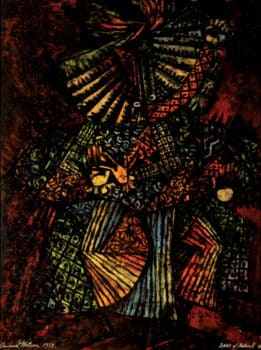
Osmond Watson (Jamaica), Spirit of Festival, 1972. Watercolor and varnished oil on paper, 104 x 78 cm.
We need to recover our tradition of national liberation Marxism but also elaborate the theory of our tradition from the work of our movements. We need to draw more attention to the theories of Ho Chi Minh and Fidel, EMS Namboodiripad and Claudia Jones. They did not only do, but they also produced innovative theories. These theories need to be developed and tested in our own contemporary reality, building our Marxism not out of the classics alone—which are useful—but out of the facts of our present. Lenin’s ‘concrete analysis of the concrete conditions’ requires close attention to the concrete, the real, the historical facts. We need more factual assessments of our times, a closer rendition of contemporary imperialism that is imposing its military and political might to prevent the necessity of a socialist world. This is precisely the agenda of Tricontinental: Institute for Social Research, of the almost thirty research institutes with which we work closely through the Network of Research Institute, and of the more than 200 political movements whose mass lines inform the development of Tricontinental’s research agenda through the International Peoples’ Assembly.
Certainly, socialism is not going to appear magically. It must be fought for and built, our struggles deepened, our social connections tightened, our cultures enriched. Now is the time for a united front, to bring together the working class and the peasantry as well as allied classes, to increase the confidence of workers, and to clarify our theory. To unite the working class and the peasantry as well as allied classes requires the unity of all left and progressive forces. Our divides in this time of great danger must not be central; our unity is essential. Humanity demands it.
Endnotes
Foreword
↩ Frantz Fanon, The Wretched of the Earth (New York: Grove Press, 2004), 101.
↩ Fidel Castro, La historia me absolverá [History Will Absolve Me] (Havana: Editorial de Ciencias Sociales, 2007).
↩ Raúl Roa, ‘Fundamentos, cargos y pruebas de la denuncia de Cuba’, In Raúl Roa: Canciller de la dignidad (La Habana: Ediciones Políticas, 1986 [1961]).
↩ Translator’s note: Nuestra América is a concept stemming from Cuban national hero Jose Martí’s 1891 essay on Latin American nationalism calling for unity among nations to foment a Pan-Latin American identity opposed to the cultural values of Europe and the United States.
↩ Fidel Castro, ‘Word to the Intellectuals’, Speech at the conclusion of meetings with Cuban intellectuals held at the National Library on 16, 23, and 30 June 1961, http://www.fidelcastro.cu/es/audio/palabras-los-intelectuales.
↩ Fidel Castro, A Revolution Can Only Be the Child of Culture and Ideas (Havana: Editora Política, 1999), http://www.fidelcastro.cu/en/libros/revolution-can-only-be-child-culture-and-ideas.
↩ Abel Prieto, ‘Sin cultura no hay libertad posible’. Notas sobre las ideas de Fidel en torno a la cultura’ [‘Without Culture There Is No Possible Freedom’: Notes on Fidel’s Ideas About Culture], La Ventana, 12 August 2021, http://laventana.casa.cult.cu/index.php/2022/08/12/sin-cultura-no-hay-libertad-posible-notas-sobre-las-ideas-de-fidel-en-torno-a-la-cultura/.
↩ Fidel Castro, Speech delivered at the Commemoration of the 60th Anniversary of his admission to University of Havana, Aula Magna, University of Havana, 17 November 2005, http://www.fidelcastro.cu/en/discursos/speech-delivered-commemoration-60th-anniversary-his-admission-university-havana-aula-magna.
↩ Today, with the use of social networks in electoral campaigns and in subversive projects, this very acute observation by Fidel about ‘conditioned responses’ carries significant weight.
↩ Castro, Speech at the Commemoration of the 60th Anniversary of his admission to University of Havana.
↩ Fidel Castro, ‘Without Culture There Is No Freedom Possible’, Key address at the opening ceremony of the 18th Havana International Ballet Festival, 19 October 2002, http://www.fidelcastro.cu/en/fragmento-portada/october-19-2002-0.
↩ Fidel Castro, ‘Concept of Revolution’, Speech at the mass rally on International Workers’ Day at Revolution Square, 1 May 2000, http://www.cuba.cu/gobierno/discursos/2000/ing/f010500i.html.
Ten Theses on Marxism and Decolonisation
1 Karl Marx and Friedrich Engels, The German Ideology (Moscow: Progress Publishers, 1968), 38.2 Food and Agriculture Organisation, Building a Common Vision for Sustainable Food and Agriculture. Principles and Approaches (Rome: FAO, 2014); FAO, IFAD, UNICEF, WFP and WHO, The State of Food Security and Nutrition in the World 2022: Repurposing Food and Agricultural Policies To Make Healthy Diets More Affordable (Rome: FAO, 2022), vi.3 Fidel Castro, Statement at the UN General Assembly, in capacity of NAM President, 12 October 1979, misiones.cubaminrex.cu
4 Tricontinental: Institute for Social Research, In the Ruins of the Present, working document no. 1, 1 March 2018, thetricontinental.org
5 Govindan Raveendran and Joann Vanek, ‘Informal Workers in India: A Statistical Profile’, Statistical Brief 24 (Women in Informal Employment: Globalising and Organising, August 2020), 1; Tricontinental: Institute for Social Research, The Farmers’ Revolt in India, dossier 41, 14 June 2021, thetricontinental.org
6 Frantz Fanon, The Wretched of the Earth, trans. Richard Philcox (New York: Grove Press), 5.
7 Organisation for Economic Cooperation and Development, ‘Global Outlook on Financing for Sustainable Development 2021’, 9 November 2020, www.oecd.org
8 Tricontinental: Institute for Social Research, Serve the People: The Eradication of Extreme Poverty in China, 23 July 2021, thetricontinental.org
9 FAO et al., The State of Food Security, vi.
10 Lusaka Times, ‘Over 60% Copperbelt Province Lower Primary Pupils Can’t Read and Write—PEO’, Lusaka Times, 18 January 2018, www.lusakatimes.com
11 Stockholm International Peace Research Institute, ‘World Military Expenditure Passes $2 Trillion for First Time’, SIPRI, 25 April 2022, www.sipri.org
12 Karl Marx, Capital: A Critique of Political Economy — Volume I, trans. Ben Fowkes (London: Penguin Books, 2004), 670.
13 Tricontinental: Institute for Social Research, Uncovering the Crisis: Care Work in the Time of Coronavirus, dossier no. 38, 7 March 2021, thetricontinental.org
14 Tricontinental: Institute for Social Research, CoronaShock and Socialism, CoronaShock no. 3, thetricontinental.org
15 Ernst Bloch, Heritage of Our Times, trans. Neville and Stephen Plaice (Berkeley; Los Angeles: University of California Press, 1991), 103.

